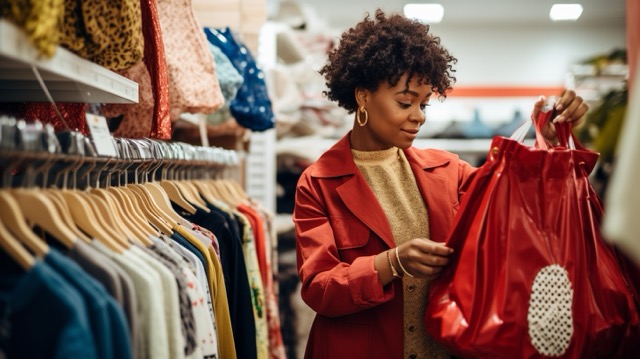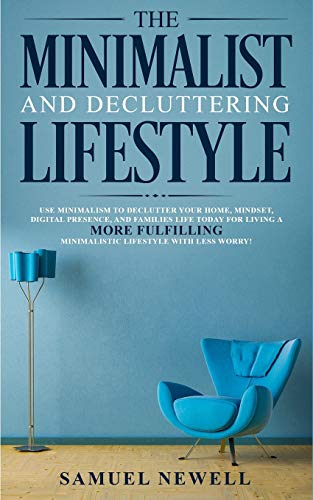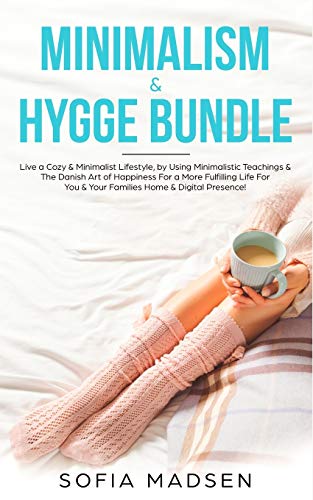Have you ever noticed how excessive consumption can lead to a vague feeling of emptiness and persistent sense of dissatisfaction? The accumulation of material possessions may feel good in that moment when you buy something and haul it home. But then what? You get used to it and pine for more stuff. Other stuff.
It’s unsustainable. At least it is for most of us.
There’s a different approach to consumption. One that can reduce stress, give you a greater sense of freedom (and more financial stability!), and free up bandwidth for things that matter more in the grand scheme of things. Like love. Family. Friends. Peace. Community.
Mindful consumerism and minimalism focus on conscious consumption. You know – quality over quantity. Opting for stuff that’s better made. More fairly manufactured and traded. Maybe being more open to secondhand shopping. Finding a balance in our pursuit of material affluence in a wasteful, consumer-driven society, and choosing high-quality things that last longer and reduce our environmental impact – without the need for frequent replacements.

Table of Contents
The Path to Intentional Consumerism
Mindful consumption and minimalism are more than just concepts; they can actually help us lead a more intentional and fulfilling life. Embarking on path of minimalism aligns our values and lifestyle, and, as I’m seeing in my own transformation, it really is true that it helps lead to a deeper understanding of ourselves and our place in the world.
When we adopt practises like frugality or simple living, we’re essentially learning to curate our lives. To consciously choose experiences and things that bring true value.
Finding Balance in Intentional Consumption
Simplifying and reducing the number of items you purchase is great, but mindful consumerism goes beyond this.
Instead of mindlessly buying a new pair of jeans, for example, you’d have a hard look at the companies whose products you’re considering buying, so you can understand their impact on the environment and society.
Making conscious decisions to choose items that align ethical and environmental values can also help reduce waste. Not to mention workers who are not being treated ethically.
Once you get on board with the principles of minimalism as a conscious consumer, you’re more apt to start supporting sustainability, ethical production, and businesses that prioritise the well-being of the planet and its inhabitants.
Side Notes: Thoughts on Greenwashing
Greenwashing runs rampant across a range of industries and brands. It shouldn’t be up to the individual to fix all the heinous ways global corporations exploit nature and humans with the good grace of the government. Taking away our plastic bags, taxing our “carbon output” or making us drink out of soggy paper straws isn’t making even a tiny dent in the situation; it’s the companies which need to be reined in, properly taxed, heavily fined, and held accountable for the colossal mess their insatiable quest for higher and higher profit margins has made.
That said, one individual can indeed revolt by directing their spending power elsewhere. And the more who do this, the greater a chance we have of making our voices heard.
How to Embrace Minimalism? Start Decluttering.
Inspired by the principles of minimalism, decluttering is usually the first tangible step most people take in embracing a more minimalist lifestyle.
It’s not all that hard. Focus on the things you love, use, and wear. They’re keepers. Stop moving clutter around. Instead, let go of anything that no longer brings value to your life or serves a purpose.
I honestly think that when decluttering becomes a way of daily life like it has in my own household, then you’ve internalised minimalism’s principles – whether consciously or not.
And the actual process of decluttering not only frees up physical space in our homes but also brings mental clarity. It’s an easy, deeply reflective and transformative way to simplify your life, and it pushes one to re-consider impulse purchases, materialism, and the potentially negative impact of all the goods and services we use, be it on our wallet or on the planet.
Tap Into Technology
Technology obviously plays a significant role these day in promoting the latest trends, but it’s also greatly helped raise awareness for sustainability, mindful consumerism and minimalism.
From apps that help us learn meditation, track our purchases, and manage our budget, to local online communities that share minimalist living tips: tech can definitely be a valuable tool if you’re looking to make some lifestyle changes.
Like anything else though, use it mindfully. Digital tools should serve your goals of simplicity and intentionality, rather than becoming another source of mental clutter and distraction.
Minimalism in Different Life Aspects
You can extend the principles of minimalism to various aspects of your life beyond just clutter in your home, including work, relationships, and leisure time.
In the workplace, mindful consumption and minimalism might mean focusing on tasks that add the most value (think of the 80:20 Pareto rule), and reducing unnecessary meetings and emails.
When you start embracing minimalism in your personal life, it can involve investing time and energy into meaningful connections rather than superficial interactions. A minimalist lifestyle tends to put an emphasis on simple pleasures in our off hours, and in hobbies that nurture our souls.
The upshot? You’ll see the constant need for new thrills dwindle. You may even find you can stop rushing around all the time.

Financial Well-Being and Minimalism
Another significant benefit to mindful consumerism and minimalism is that there’s simply less drain on your wallet, so you can gain more financial freedom. Not to mention the degree of personal growth minimalism encourages in an individual.
Spending less on unnecessary items means we can save more and reduce financial stress. Or maybe just buy healthier food.

Here again, the newfound liberty brought on by mindful consumption and minimalism allows us to make choices that better align with our personal values, whether they entail work-life balance, nurturing passions, or contributing to sustainable causes in the community.
Environmental Impact of Mindful Consumerism and Minimalism
Conscious consumption and simple living clearly have environmental benefits when they’re collectively practised. If the majority of us were consuming less and choosing eco-friendly products, we could reduce our emissions at least a tiny bit and help contribute to the preservation of natural resources.
I’m not so naive as to say the individual stands a chance of going up against the filth of big pharma, fast fashion or the military industrial complex for that matter. But don’t undermine the power of consumerism. Minimalism encourages individuals to make a shift towards a sustainable, circular economy per se, and if more and more items were reused, recycled, or shared, well, maybe we really could make a little difference in the world.
Adapting to the Minimalist Lifestyle
The mindful consumption movement is supported by a growing community of people such as those over at Slow Fashion Global, who seek balance and share their experiences, challenges, and successes in a consumerist society. It’s a great way to find like minds.
Engaging with a community online or finding a local group can provide you with valuable inspiration, support, and practical tips for your own journey towards a minimalist lifestyle. You might even make some new good friends along the way. Blogs, social media, and local groups all make it easy to connect with like-minded folks to stay motivated and inspired.
A Path to a More Conscious and Satisfying Life
This was really just a hodgepodge of random thoughts I’ve been having now that I’m nearly three years into slimming down my own inventory and curbing my spending. If I had to sum it up today, I’d say mindful consumption has opened up a path for me to a more conscious, balanced, satisfying, and ultimately meaningful life. Things I used to desperately covet now seem silly to me.
So, yes, minimalism promotes an emphasis on stuff that actually matters, rather than possessions per se. When you combine it with conscious spending, you’ve got a powerful mental toolkit to find more contentment, clarity, and a sense of greater purpose in your day-to-day.
Embracing the minimalist lifestyle is less about flipping a switch and making radical changes that will be too hard to stick with. Deprivation isn’t likely going to you make feel better. But enriching your life with experiences, relationships, and activities that align with our values for personal growth will.











Leave a Reply